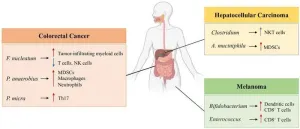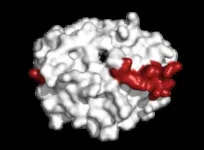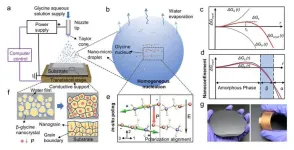(Press-News.org) A vast number of microbes colonizes the human body to form an ecological community known as the microbiota. Microbiota are made up of bacteria, viruses, fungi, and archaea. These microbes are closely associated with the physiology and function of the human body. The gut microbiota has received tremendous research attention with the recent advance in metagenomic sequencing.
Under normal conditions, the gut microbiota is maintained in homeostasis, yet it is readily affected by various environmental factors, including diet and use of antibiotics. Once its composition and function become imbalanced or in dysbiosis, the gut microbiota may contribute to the pathogenesis of various diseases, including cancer. Research has identified the impacts of gut microbiota on the development of various cancers, such as colorectal cancer (CRC), gastric cancer, and hepatocellular carcinoma (HCC). In general, the gut microbiota in cancer patients is significantly altered with the enrichment of pathogenic microbes (e.g., Helicobacter pylori for gastric cancer and Fusobacterium nucleatum for CRC), leading to the acceleration of cancer development and progression.
In a new paper published in eGastroenterology, a team of scientists led by Professor Jun Yu from The Chinese University of Hong Kong have reviewed the interplay between host immune alteration and gut microbiota in tumorigenesis of various cancer types, including colorectal cancer, liver cancer and melanoma.
Increasing evidence showed that the gut microbiota could affect the responsiveness and efficacy of cancer treatment. Immunotherapy has emerged since the last decade. In particular, is immune checkpoint blockade, which uses monoclonal antibodies to target immune checkpoints, and has demonstrated significant therapeutic efficacy in patients with different types of cancer. As immunotherapy aims to enhance host antitumor immunity, it can eliminate tumor cells more precisely than traditional treatments with less damage to normal cells.
A few immune checkpoint inhibitors (ICIs) have received FDA approval to treat several types of gastrointestinal cancer. Given the intricate interaction between host immunity and gut microbiota, it is reasonable to speculate that microbes can influence ICI efficacy. Indeed, more and more studies have suggested that gut microbiota plays a crucial role in shaping the efficacy of immunotherapy.
In reviewing the topic, the research team sought to discuss the effect of microbiota on cancer immunotherapy and harnessing gut microbiota in improving response to immunotherapy.
Under normal or non-cancerous conditions, the gut microbiota is closely associated with maintaining the mucosal immune system's structure and function and helps defend against any invaded pathogens. In the tumor microenvironment, tumor cells evade the attack of the immune system via different mechanisms. Those mechanisms include the upregulation of immunosuppressive ligands on the surface of tumor cells and the release of T cell suppressors (e.g., arginase) to inhibit intratumoral infiltration of effector T cells. These immunosuppressive features are indeed significant barriers to overcome. While they also provide rationales for developing therapeutic approaches, particularly ICIs that specifically target antitumor immunity.
The gut microbiota is important in regulating immunity and modulating response to cancer therapy. The effect of microbiota in the context of cancer can be either local or systemic, depending on different pathological conditions. The research team has presented the results of several recent studies, both in experimental animals and humans, indicating that gut microbiota can boost the efficacy of immune checkpoint blockade. However, the underlying mechanisms still require further investigation.
Moreover, it is also increasingly acknowledged that modulation of microbes homing to the intestinal mucosal epithelium or tumor microenvironment may potentially serve as a promising anticancer therapy by itself or as an adjunct of cancer therapy to improve treatment efficacy. The current findings provide solid evidence that modulating the gut microbiota may have important clinical implications, leading us to achieve safer and more efficient cancer treatments in the future.
About eGastroenterology
eGastroenterology is a new, open-access, and open peer-reviewed BMJ Journal, which focuses on basic, clinical, translational, and evidence-based medicine research in all areas of gastroenterology (including hepatology, pancreatology, esophagology, and gastrointestinal surgery).
For more information, please visit: egastroenterology.bmj.com and follow us on Twitter(@eGastro_BMJ)
END
Gut microbiota and immune alteration in cancer development: implication for immunotherapy
2023-08-10
ELSE PRESS RELEASES FROM THIS DATE:
Diabetes linked to functional and structural brain changes through MRI
2023-08-10
The longer a person has type 2 diabetes, the more likely they may be to experience changes in brain structure, a Michigan Medicine study finds.
Researchers analyzing data from 51 middle-aged Pima American Indians living with type 2 diabetes used a series of memory and language tests developed by the National Institutes of Health, called the NIH Toolbox Cognitive Battery, as well as MRI, to determine the relationship between diabetes, cognition and makeup of the brain.
Brain imaging suggested that study participants with longer durations of type 2 diabetes had decreased mean cortical thickness ...
Turning ChatGPT into a ‘chemistry assistant’
2023-08-10
Developing new materials requires significant time and labor, but some chemists are now hopeful that artificial intelligence (AI) could one day shoulder much of this burden. In a new study in the Journal of the American Chemical Society, a team prompted a popular AI model, ChatGPT, to perform one particularly time-consuming task: searching scientific literature. With that data, they built a second tool, a model to predict experimental results.
Reports from previous studies offer a vast trove of information that chemists need, but finding and parsing the most relevant details can be laborious. ...
A therapeutic target for Alzheimer's disease discovered
2023-08-10
Québec City, August 10, 2023 - Scientists at Université Laval and the University of Lethbridge have succeeded in reversing certain cognitive manifestations associated with Alzheimer's disease in an animal model of the disease. Their results have been published in the scientific journal Brain.
"Although this has yet to be demonstrated in humans, we believe that the mechanism we have uncovered constitutes a very interesting therapeutic target, because it not only slows down the progression of the disease but also partially restores certain cognitive functions," ...
Common cold virus linked to potentially fatal blood clotting disorder
2023-08-10
CHAPEL HILL, N.C. – Platelets, or thrombocytes, are specialized cellular fragments that form blood clots when we get scrapes and traumatic injuries. Viral infections, autoimmune disease, and other conditions can cause platelet levels to drop throughout the body, termed thrombocytopenia.
After a robust clinical and research collaboration, Stephan Moll, MD, and Jacquelyn Baskin-Miller, MD, both in the UNC School of Medicine, have linked adenovirus infection with a rare blood clotting disorder. This is the first time that the common ...
Education program tackles race-based cancer health disparities
2023-08-10
HOUSTON – (Aug. 10, 2023) Rice University chemist Carolyn Nichol has won a competitive Science Education Partnership Award (SEPA) from the National Institutes of Health to address race-based cancer health disparities by increasing underrepresented minority student populations’ engagement and participation in biosciences education.
The 5-year, $1,038,544 award will support Nichol’s Cancer Health Activism Network for Greater Equity (CHANGE) project in bringing together cutting-edge cancer research with insight on race-based healthcare disparities from the social sciences in a series of transformative high school biology lessons aligned with both ...
Font size can 'nudge' customers toward healthier food choices
2023-08-10
PULLMAN, Wash. -- Restaurants can persuade patrons to choose healthier foods by adjusting the font size of numbers attached to nutritional information on menus, according to a study headed by a Washington State University researcher.
Lead researcher Ruiying Cai, an assistant professor in the WSU School of Hospitality Business Management, said U.S. restaurants with more than 20 locations are already required to show the calorie content of food on their menus. By representing these values incongruously — using physically larger numbers on the page when they’re attached to ...
Researchers unlock mystery of cartilage regeneration in lizards
2023-08-10
A team of researchers from the Keck School of Medicine of USC have published the first detailed description of the interplay between two cell types that allow lizards to regenerate their tails. This research, funded by the National Institutes of Health and published on August 10 in Nature Communications, focused on lizards’ unusual ability to rebuild cartilage, which replaces bone as the main structural tissue in regenerated tails after tail loss.
The discovery could provide insight for researchers studying how to rebuild cartilage damaged by osteoarthritis in humans, a degenerative and debilitating disease that affects about 32.5 million adults ...
Space weather and satellite security: Graz University of Technology and University of Graz supply new forecasting service for the ESA's Space Safety Programme
2023-08-10
After a successful test phase, the Satellite Orbit DecAy (SODA) service, which was jointly developed by TU Graz and the University of Graz, officially became part of the ESA’s Space Safety Programme in mid-July. SODA provides accurate forecasts of the effects of solar storms on low Earth orbiting satellites. This makes TU Graz only the third Austrian institution contributing to this ESA programme. Seibersdorf Laboratories, and the University of Graz, through the Kanzelhöhe Observatory and the Institute of Physics, ...
New high-tech microscope using AI successfully detects malaria in returning travelers
2023-08-10
Each year, more than 200 million people fall sick with malaria and more than half a million of these infections lead to death. The World Health Organization recommends parasite-based diagnosis before starting treatment for the disease caused by Plasmodium parasites. There are various diagnostic methods, including conventional light microscopy, rapid diagnostic tests and PCR.
The standard for malaria diagnosis, however, remains manual light microscopy, during which a specialist examines blood films with a microscope to confirm the presence of malaria parasites. ...
HKUST researchers pioneers technique to self-assemble high-performance biomolecular films
2023-08-10
A research team led by The Hong Kong University of Science and Technology (HKUST) has developed a novel technique to self-assemble a thin layer of amino acids with ordered orientation over a large area that demonstrates high piezoelectric strength, making the manufacturing of biocompatible and biodegradable medical microdevices, such as pacemaker and implantable biosensor, in the near future possible.
The generation of bioelectricity from the piezoelectric effect – reversible conversion between mechanical and electrical energies – has physiological significance in living systems. ...






